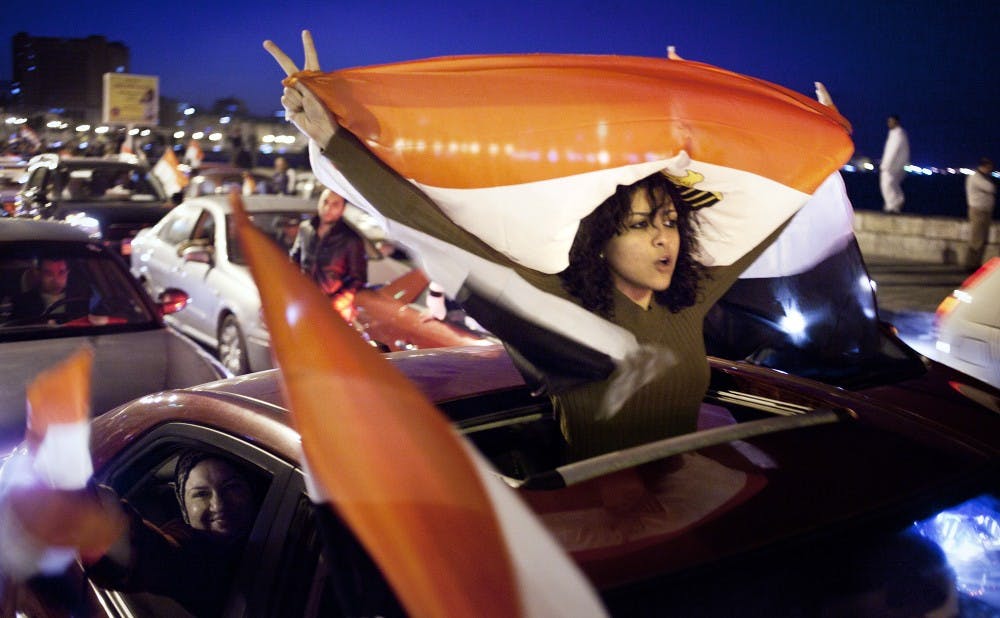As a photojournalist in Egypt during the Arab Spring revolutions, David Degner has photographed some of the most influential events of this century. One of the few photographers to have access to the Middle East—including Libya and Syria—during the revolutions, Degner photographed for several publications, from "Time" to "The Wall Street Journal." He will be at Duke on Nov. 12 and 13 to give talks at the Center for Documentary Studies (CDS) and the Center for International Studies (CIS).
Despite the romantic-sounding nature of his last couple years, Degner had a long journey to reach his current position. “It was a very circuitous route to get here,” Degner admitted.
Graduating from Western Kentucky University with a double major in photojournalism and philosophy, he interned at the "St. Petersburg Times" after college. Using the money he saved from working, Degner packed his bags and went to China a few months before the Olympics to cover the Uyghur people, the often-persecuted ethnic group of Chinese Muslims.
“I was an absolute failure at being a journalist there,” Degner said. “I had no deadlines. I had complete freedom to talk to people whenever I wanted and to explore this huge region. I was eventually kicked out a month before the Olympics, so that ended my China expedition.”
As Degner describes it, his life seems to have consisted of doing small photography jobs until his next big “adventure.” After China, Degner worked as a wedding photographer, saving up enough money to go to Egypt. Because he was working on a small budget, cost became very important in deciding where he went. In China, the cost of food was around $1 a day, allowing Degner to stay for a long period of time.
“One of the reasons I came to Egypt is because it is so cheap to live here,” he said. “I came about six months before the revolution. I was just doing my thing for six months. Then, the revolution started and, all of a sudden, photographers were in demand.”
Because Degner was truly in the right place at the right time, he was able to move around the region freely, capturing moments that no other photojournalist could. “I’m trying to show something more than the normal violence and blood in the street,” he explained. “Although there is plenty of that too in my portfolio, sadly.”
Even though his work has been featured in several major publications, Degner is still a freelancer. With that sort of title, jobs can be hard to come by.
“As a freelancer, there’s always the question of why someone hasn’t called me in the last week or if someone is going to call me within the next week,” he said. “You never actually know if you’re doing well or not. An assignment comes and goes or a personal project comes and goes, and you’re back to square one.”
Alex Harris, professor of public policy and documentary studies at Duke, sees Degner’s position as a positive. “In most cases, he’s working as a freelancer. He may be assigned a subject, but no one can tell you how to approach a particular subject or take a photograph in the way he does,” said Harris.
Fortunately for Duke, Degner's career as a freelancer has allowed him the freedom to give talks at the university. The key organizer in bringing Degner to Duke was Anna Kipervaser, a candidate for Master of Fine Arts in Experimental and Documentary Arts. She met Degner while searching for a videographer to film in Cairo for her current project.
“It’s been a really good working relationship,” Kipervaser said of Degner. “He just does a really good job and happens to be where he needs to be.”
Kipervaser introduced her classmates and professor, Harris, to Degner’s work, citing him as an influence. Everyone was instantly enamored, according to Kipervaser. Harris and Kipervaser then contacted Degner to come to Duke and speak at a series of events, which sparked interest from more departments.
The two main events that involve Degner are at CDS and CIS. On Nov. 12, Degner will be at CDS for a “pre-talk reception” to “show that he’s human,” as Kipervaser described. The talk will follow Degner's progression as a photographer through the Arab Spring and the upheavals that followed. On Nov. 13, he will discuss safety issues and mobility throughout the Middle East as part of the CIS's artist talk series on globalization.
“We do hope that, because the two events are different, all people will want to participate in both,” said Kipervaser.
Indeed, Degner's wealth of experience and unique viewpoint on life should allow for many stimulating conversations with Duke faculty and students. Harris hopes that Degner’s visit will bring a human face to the conflicts in the Middle East.
“Bringing him here is one way of humanizing the issues that he reports on,” Harris said. “Someone like David helps us to take the more dramatic images that are branded in our minds and come up with stories behind them.”
Degner's passion for his work was made clear when he explained his willingness to travel the world on a low budget and regularly put himself in dangerous situations.
“What else are you going to do?” Degner asked. “Sit in an office all day? Be a dentist? There are great dentists out there who love doing that, but I don’t think I would’ve been happy as a dentist. You’ve just got to line up all the pieces and hope it softens the fall a little!”
Degner will speak at the Center for Documentary Studies on Tuesday, Nov. 12, and at the Center for International Studies on Wednesday, Nov. 13. For more details, visit http://cdsporch.org/archives/20535.
Get The Chronicle straight to your inbox
Signup for our weekly newsletter. Cancel at any time.

